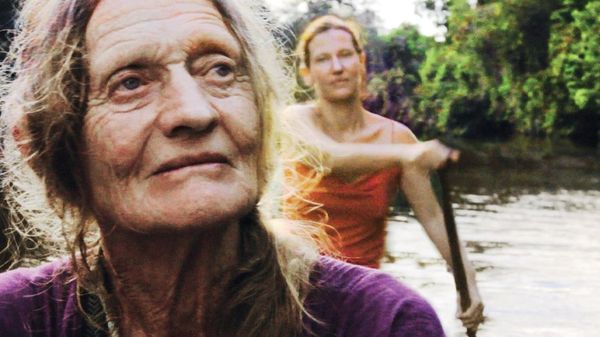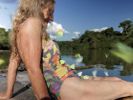Eye For Film >> Movies >> Amazona (2017) Film Review
Amazona
Reviewed by: Amber Wilkinson

Clare Weiskopf's documentary (co-directed by her husband Nicolas van Hemelryck) about the extraordinary life of her mother Val, is at intensely personal and specific but also finds resonance in universal themes surrounding family and freedom. The title, meanwhile, serves as a double-evocation, calling to mind the female warriors of Greek mythology but also the twisting journey of its river namesake, tributaries of which a viewed snaking their way the Columbia where Val has spent most of her life near the start of the film.
A project that Weiskopf had in her mind for around two decades, the planning of her own path to motherhood seems to have given it added impetus, as she tries, through a series of conversations, to 'solve' the mystery of her mum. Val sets great stock by her free-spirit credentials, with her desire for adventure beyond the regular confines evidenced even from her early adulthood, when she left Britain, on what seems almost like a whim, for love in Colombia. Freedom of place, we come to learn, is not necessarily freedom of spirit, highlighted in one of many moments of acute self-awareness, when Val says, "I think I would be happy in the place I do not happen to be".

There's no doubt she has tried plenty of places and people, from Bogota to the Colombian reservation through to a commune in Ireland, sometimes with her children (Clare, her brother Diego and two half-sisters Carolina and Liliana) and sometimes alone. As Val's life story unfolds, secrets are revealed - not just by her but by Clare. There is no doubt that Val tends towards the pragmatic - as a key scene in which she feeds a live kitten to a snake shows - but there is also room, if not for regret, than for a sorrow for some elements of her past.
The director makes judicious use of old family photos and voice-over along with some strong nature photography that anchors the documentary in terms of place. The story may not flow along conventional lines, but most of its unexpected inlets are worth the trip.
Weiskopf is not interested in simplistic branding of what makes a 'good' or 'bad' mum but rather, in trying to understand the emotional driving force that led to her mother's decisions and which have had their own emotional repercussions for her children, particularly the director and her brother Diego. At the end, she unwraps some of the mystery, but is still left with an enigma.
Reviewed on: 27 Jul 2017















